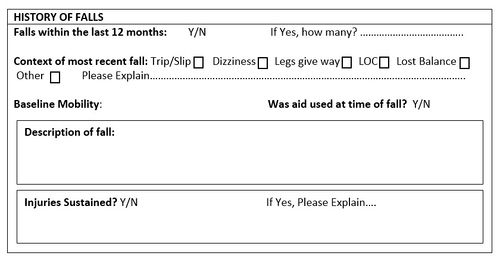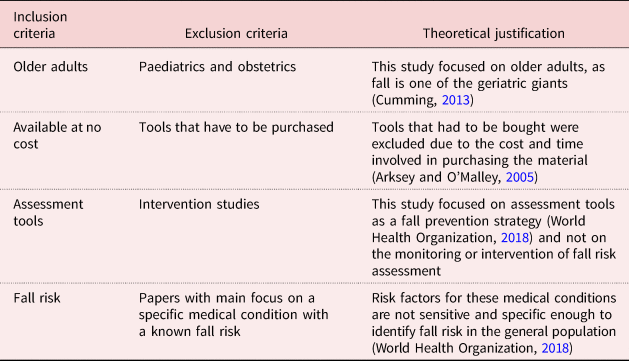Facts About Dementia Fall Risk Revealed
Facts About Dementia Fall Risk Revealed
Blog Article
The Single Strategy To Use For Dementia Fall Risk
Table of ContentsThings about Dementia Fall RiskDementia Fall Risk Fundamentals ExplainedThe smart Trick of Dementia Fall Risk That Nobody is Talking AboutDementia Fall Risk - An OverviewSome Of Dementia Fall Risk
Evaluating autumn danger helps the entire healthcare group create a more secure environment for each individual. Make certain that there is a marked location in your medical charting system where personnel can document/reference scores and record pertinent notes connected to fall avoidance. The Johns Hopkins Autumn Danger Evaluation Tool is just one of several tools your staff can use to aid prevent damaging clinical events.Person falls in healthcare facilities prevail and incapacitating unfavorable occasions that continue despite years of initiative to decrease them. Improving interaction across the evaluating nurse, treatment team, person, and client's most involved family and friends may reinforce fall avoidance efforts. A team at Brigham and Female's Health center in Boston, Massachusetts, sought to create a standardized loss prevention program that focused around enhanced interaction and individual and household interaction.

The technology group highlighted that successful execution depends on client and staff buy-in, assimilation of the program right into existing process, and fidelity to program procedures. The team noted that they are coming to grips with how to ensure connection in program application during durations of dilemma. During the COVID-19 pandemic, for example, an increase in inpatient drops was connected with restrictions in individual engagement in addition to limitations on visitation.
The Buzz on Dementia Fall Risk
These incidents are typically taken into consideration avoidable. To carry out the intervention, companies need the following: Access to Fall suggestions resources Loss pointers training and retraining for nursing and non-nursing team, consisting of new nurses Nursing operations that permit individual and family members engagement to conduct the drops assessment, make sure usage of the prevention plan, and perform patient-level audits.
The outcomes can be highly harmful, frequently speeding up patient decline and creating longer hospital stays. One research estimated remains increased an added 12 in-patient days after an individual loss. The Fall TIPS Program is based on appealing clients and their family/loved ones throughout three major processes: evaluation, personalized preventative interventions, and bookkeeping to guarantee that patients are participated in the three-step autumn prevention process.
The individual assessment is based upon the Morse Autumn Range, which is a confirmed loss threat assessment device for in-patient health center settings. The scale includes the six most common reasons patients in medical facilities drop: the individual loss history, high-risk problems (consisting of polypharmacy), use IVs and various other exterior gadgets, psychological status, stride, and flexibility.
Each threat variable web links with one or even more workable evidence-based treatments. The registered nurse develops a strategy that integrates the treatments and shows up to the care team, person, and family on a laminated poster or printed visual aid. Registered nurses create the strategy while meeting the client and the person's family members.
Some Of Dementia Fall Risk
The poster acts as a communication device with other members of the person's care group. Dementia Fall Risk. The audit element of the program includes analyzing the client's knowledge of their threat aspects and prevention strategy at the unit and health center levels. Registered nurse champions carry out a minimum of five specific interviews a month with patients and their households to check for understanding check my reference of the autumn avoidance plan

A projected 30% of these falls result in injuries, which can vary in intensity. Unlike other adverse occasions that call for a standard scientific reaction, fall avoidance depends extremely on the needs of the person. Consisting of the input of people that know the individual best permits higher personalization. This approach has actually shown to be more effective than fall avoidance programs that are based mainly on the manufacturing of a danger rating and/or are not adjustable.
The Definitive Guide for Dementia Fall Risk

Based on bookkeeping outcomes, one site had 86% conformity and two websites had over 95% compliance. A cost-benefit evaluation of the Fall pointers program in eight health centers approximated that the program cost $0.88 per person this contact form to execute and caused cost savings of $8,500 per 1000 patient-days in direct expenses related to the avoidance of 567 falls over 3 years and eight months.
According to the innovation team, companies thinking about implementing the program must conduct a preparedness assessment and falls prevention voids analysis. 8 In addition, organizations must ensure the needed infrastructure and process for execution and establish an implementation strategy. If one exists, the organization's Loss Prevention Task Pressure should be associated with preparation.
The 8-Minute Rule for Dementia Fall Risk
To begin, companies need to ensure completion of training modules by nurses and nursing assistants - Dementia Fall Risk. Healthcare facility staff ought to examine, based upon the requirements of a hospital, whether to make use of an electronic health and wellness record printout or paper version of the autumn prevention strategy. Carrying out teams must recruit and educate nurse champions and establish processes for auditing and coverage on loss information
Team require to be entailed in the procedure of upgrading the workflow to engage individuals and family members in the analysis and avoidance plan process. Systems should be in place so that units can understand why a loss took place and remediate the reason. A you can try this out lot more particularly, nurses should have channels to supply recurring feedback to both personnel and unit management so they can change and enhance fall avoidance workflows and connect systemic troubles.
Report this page